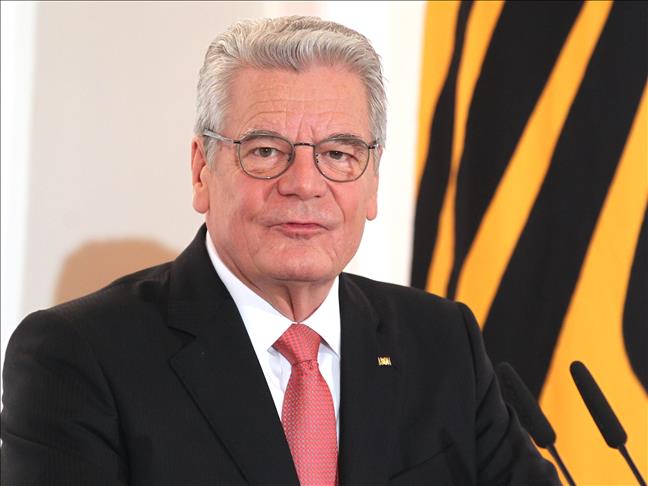
BERLIN
German President Joachim Gauck has called on his country's citizens not to forget the crimes of the Nazi regime and to stand up against every form of exclusion and violence.
His comments came on Tuesday as the 70th anniversary of the liberation by Russian troops of the Auschwitz-Birkenau Nazi death camp in what was then German-occupied Poland was being commemorated around the world.
"Holocaust is part and parcel of our country’s history," Gauck said in key address at the German parliament in Berlin.
“Remembering the Holocaust remains a matter for every citizen of Germany,” he added.
He said he did not share concerns that the younger German generation was losing interest in the lessons of Nazi history, but he believed examination of the past will continue to change, and has to do so.
Gauck said: "Future generations will certainly seek new forms of commemoration and, while the Holocaust will not necessarily be among the central components of German identity for everyone in our country, it will still hold true that there is no German identity without Auschwitz."
Holocaust remembrance 'shunned'
About six million Jews, as well as prisoners of war and others considered "undesirable" or racially inferior, are believed to have died during the genocide carried out by Nazi Germany - including more than one million at the Auschwitz concentration camp, which was liberated on January 27, 1945 by the Soviet Red Army.
But a recent study by the Bertelsmann Foundation revealed the majority of Germans no longer wish to consider the Holocaust at length.
A total of 81 percent of Germans surveyed said they preferred to put the history of the Holocaust behind them, according to the study published on Monday.
And 80 percent of young Germans between the age of 18 and 29 said they felt "angry" that they were still being blamed for crimes committed by the Nazi regime against Jews and other ethnic and social groups.
“While there is no desire to deny history, the German public is clearly committed to cultivating a positive German identity based on other aspects of its culture,” the study concluded.
'Moral obligations'
Gauck emphasized that Germany’s moral obligations due to the crimes of the Nazi regime cannot be fulfilled solely at the level of remembrance.
He emphasized that contemporary Germans should stand up against every form of exclusion and violence and continue to offer a safe haven to those who are fleeing persecution, war and "terror".
“We say this at a time when we in Germany must work to reach a new understanding of the coexistence of different religious and cultural traditions. The community in which we all want to live will only flourish if we respect the dignity of the individual and if we live in solidarity,” Gauck said.
Gauck's call came as Germany continues to witness an increase in suspicion and negative feelings towards Muslims, immigrants and refugees.
Growing fear
Far-right and rightwing populist parties have sought to benefit from a growing fear of Islam, which was largely influenced by reports of murders and atrocities being committed by terrorist groups including the Islamic State of Iraq and the Levant, or ISIL.
Germany’s Islamophobic PEGIDA movement gathered 25,000 protestors in Dresden on Jan. 12, in the aftermath of the attack on satirical magazine Charlie Hebdo in Paris in which 12 people died.
Germany Chancellor Angela Merkel has warned against a "general suspicion" of Muslims after the attack and emphasized that the vast majority of Muslims in Germany are citizens who respect the rule of law and the nation's constitution.
Germany has the second-largest Muslim population in Western Europe after France.
Among the four million Muslims in the country, three million are of Turkish origin.
Leading Muslim organizations in the country say the source of the radicalization of some young Muslims is not Islam itself, but sociological problems they face, such as discrimination, unemployment or a lack of future prospects.
Anadolu Agency website contains only a portion of the news stories offered to subscribers in the AA News Broadcasting System (HAS), and in summarized form. Please contact us for subscription options.







